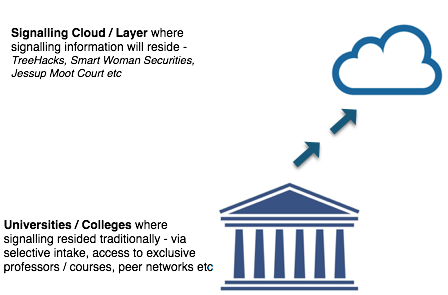The Wall Street Journal recently wrote about how graduates of less-known institutions find it hard to break through into Wall Street. This isn’t a new problem for lesser-known institutions. In fact this is one of the reasons why students compete hard to get into selective institutions such as Princeton or Williams, where there is a history of recruitment by big firms.
In the past, I have written about how selectivity of intake is a great signal to employers, and how companies coming to hire at institutions such as Harvard or IIMA are using the selectivity of intake at these places as a proxy for the potential of their hires. Sure, this could work for the Ivy League and other selective colleges. But what about colleges outside this list like NorthWestern or University of Florida. Certainly there are good students there. How could one select these students? What are the proxies or signals a recruiter can use at these colleges?
Let us actually flip that question around. How could a bright student in these lesser-known colleges signal to recruiters that I am on par with the best? Is there a signalling platform that he can tap into, distinct from that of the college? In fact, there are a few which I will talk about, presently in Finance and Engineering. And clearly there is a need for more, across different career tracks, and this presents an opportunity for startups and new ventures.
The best example of how signalling information has moved out from colleges into an external organization is Hackathons (NYT recently covered this). Students see participation in these hackathons — and keep in mind that some of the bigger hackathons such as TreeHack and MHacks are really tough to get into – as an opportunity to learn, network with peers, pitch themselves to recruiters; all three of which are precisely what a college exists to do!
Clearly if an external organization can help me get all that a college can give, then what stops a bright engineering student / hacker from joining a less prestigious college, or one that gives him a free ride, and build his credentials by participating in these hackathons?
The equivalent of Hackathons for Law Students would be international moot court competitions such as Jessup, and for MBA students (especially those pitching themselves to consulting cos) would be case study competitions (a well-known one is the John Molson Case Contest). However they are not as strong signalling systems as Hackathons. This has a lot to do with the nature of Programming. A lot of the learning part in coding is by doing / tinkering and credentials have much less value, whereas for law firms and consulting cos, your credentials have huge value and are also entry barriers (law).
Other example of signalling moving out of colleges include
- Smart Woman Securities, an organization that aggregates finance enthusiasts (only women) across colleges (including Ivy League and less known ones such as Gettysburg, Fordham etc)Incidentally one of the co-founders of Smart Women Securities, Tracy Britt Cool is now Warren Buffett’s protege.
- AIESEC, an association of college students that works on student exchange and internships
- Github, Dribbble, Behance and personal blogs as a way to demonstrate your portfolio
We can visualize these in terms of a signalling layer or cloud, a term I borrow from technology, to indicate a layer outside of the traditional education stack where the signalling information resides. Increasingly as more and more platforms and players populate the signal cloud, colleges and universities will have to resign themselves to competing on other factors.
What could be examples of platforms or products that could emerge on the signalling layer? Typically I see these aimed at Tier 2 or 3 institutions, or for an even better moniker, non-selective colleges, say those which admit over 50% of the students who apply to them). Let me try and think out aloud a few ideas.
- For students in law schools, could there be a version of a Law Review that could emerge, independent of any one college, but possibly with chapters across colleges, which becomes a way for members of the Review Committee to signal scholarship.
- For students in Humanities & Liberal Arts programs, could there be a mentoring program, one which connects you to senior execs where you work as their EA / assistant. Enstitute is a play on this, though it is a full-time program with no formal credentials. But for those who dont want to drop out formally, this mentor / internship would be a way to test waters and acquire skills. University of Waterloo, Drexel, NorthEastern all have some variant of this for their students exclusively, but there is no cross-college platform.
- In countries like India, where the average undergrad degree is extremely poor in rigour and is a weak signal, I see opportunities for a CLA+ type assessment test. To some degree, you could see GATE, a test for determining selection into Masters’ Programs into IIT, IISc as playing a similar role. A large number (last year 889,000 of which about 149,000 qualified) take it while the number of Masters’ level seats is about 15,000. Not all of these Masters’ level seats are filled. So clearly GATE is being taken for reasons other than for MTech and MSc.
- I must also add Aspiring Minds as a player in this space as well. All of them measure the student but what if you asked students in their 2nd or 3rd year to take the test, and then selected a smaller number for upskilling / coaching / mentoring. Could you put them into a Honors equivalent track which combines skilling with measurement? This would be a bigger though more complex opportunity.

